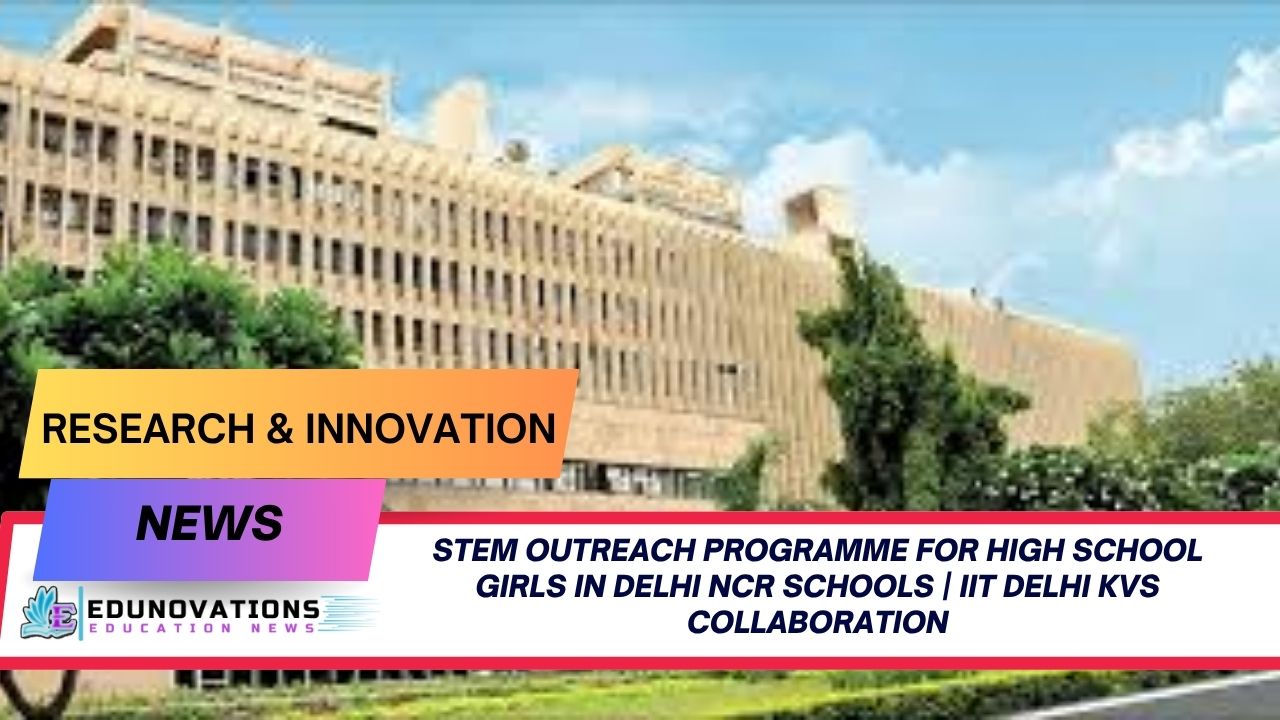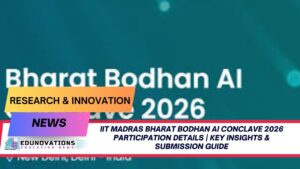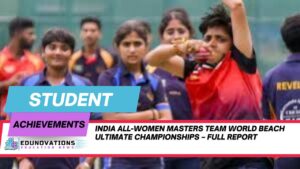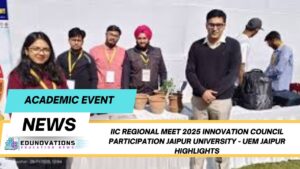IIT Delhi launches a STEM outreach programme for high school girls in Delhi NCR schools under an MoU with Kendriya Vidyalaya Sangathan, promoting science education and teacher training for inclusive innovation.
Building a Future of Innovation and Inclusion
The STEM outreach programme for high school girls in Delhi NCR schools marks a new milestone in India’s drive toward equitable science and technology education. The Indian Institute of Technology Delhi (IIT Delhi) has partnered with the Kendriya Vidyalaya Sangathan (KVS) to develop a collaborative framework that nurtures curiosity, scientific inquiry, and leadership among students—especially young women from government schools.
This partnership, formalized through a Memorandum of Understanding (MoU) signed recently at the IIT Delhi campus, aims to strengthen STEM (Science, Technology, Engineering, Mathematics) education and teacher professional development. The initiative focuses on experiential learning, mentorship, and exposure to cutting-edge research environments that can inspire students to pursue careers in science and innovation.
The Vision Behind the Collaboration
The collaboration between IIT Delhi and KVS isn’t merely symbolic—it represents a structured approach to bring research-driven learning into school education. Through this partnership, IIT Delhi will offer academic mentorship, laboratory access, and interactive workshops for students of classes 9 to 12, helping them translate classroom concepts into real-world applications.
Dr. Rangan Banerjee, Director of IIT Delhi, highlighted that the collaboration reflects IIT Delhi’s commitment to national capacity building.
“We believe exposure to modern STEM learning environments can empower school students—especially girls—to become confident problem-solvers and innovators. It’s essential that our future scientists come from every section of society,” said Dr. Banerjee.
Strengthening STEM Education for Girls in Government Schools
Despite significant progress in India’s educational ecosystem, female representation in STEM fields continues to lag. According to a 2024 UNESCO report, only 28% of India’s research positions are held by women. To bridge this gap, IIT Delhi’s initiative targets high school girls in Delhi NCR government and Kendriya Vidyalaya schools, promoting confidence and inclusion through sustained mentorship.
The STEM outreach programme for high school girls in Delhi NCR schools will integrate interactive experiments, coding modules, robotics sessions, and scientific demonstrations led by IIT Delhi research scholars and faculty. The hands-on approach helps students link theory with tangible outcomes—whether building small-scale engineering models or exploring AI-based problem-solving.
For in-depth educational resources and foundational learning materials, students can explore
👉 NCERT Courses,
👉 Notes, and
👉 Free NCERT PDF Downloads.
Teacher Professional Development in STEM
A key component of the IIT Delhi–KVS collaboration is teacher training in STEM methodology for Kendriya Vidyalaya schools 2025. The MoU emphasizes continuous professional development for teachers, enabling them to adapt to new technologies and pedagogical tools.
Through periodic training sessions and exposure visits, educators will learn about emerging STEM tools—such as AI-driven simulations, virtual laboratories, and data-based inquiry learning—to make classroom teaching more dynamic.
Teachers will also collaborate with IIT Delhi experts to design student-centric projects aligned with India’s National Education Policy (NEP 2020), ensuring that innovation and critical thinking remain central to school curricula.
For structured learning support, educators can refer to
👉 MCQs,
👉 Current Affairs, and
👉 Syllabus Updates.
A Broader Push for Inclusive STEM Innovation
This initiative forms part of a growing network of outreach efforts across the country. IITs and central universities have been organizing science camps, mentorship initiatives, and online courses to democratize access to STEM learning. However, IIT Delhi’s model stands out for its specific focus on school students’ STEM mentorship initiatives for classes 9-12 in Delhi NCR, with a strong gender-inclusive approach.
The programme also aligns with the government’s Atal Innovation Mission and Vigyan Jyoti scheme, both designed to strengthen the participation of girls in science. According to officials, more than 10,000 students are expected to benefit directly through workshops, summer schools, and innovation challenges over the next two years.
Expert Perspectives on the Impact
Education reform specialists have welcomed this initiative as a timely intervention.
Dr. Vandana Narayan, education policy expert at the Centre for STEM Learning, observed:
“Collaborations like IIT Delhi–KVS are vital in breaking stereotypes that limit girls’ participation in science. Practical exposure at a formative age transforms career aspirations.”
Similarly, Prof. Manoj Singh, a senior faculty member at IIT Delhi’s Department of Mechanical Engineering, noted that hands-on STEM projects instill problem-solving and leadership skills.
“When students engage with real engineering and research challenges early on, they visualize science not just as theory but as a way to improve society,” he remarked.
The Roadmap: From Classrooms to Laboratories
Under the MoU, IIT Delhi will conduct periodic orientation sessions for KVS teachers and students, organize innovation fairs, and open laboratories for educational visits. Students will be encouraged to undertake small research projects evaluated jointly by KVS faculty and IIT Delhi mentors.
To facilitate this outreach, IIT Delhi will establish a Structured Feedback Mechanism ensuring continuous monitoring and refinement of teaching methods. These interventions will strengthen the scientific temperament of students while helping educators implement project-based learning.
For schools seeking to digitize their learning environment or create online outreach portals, expert IT services such as Mart Ind Infotech can help design secure, user-friendly websites tailored for educational institutions.
Empowering the Next Generation of Innovators
The collaboration’s long-term vision is to cultivate a STEM-literate society, where curiosity and experimentation form the foundation of education. As the initiative evolves, IIT Delhi plans to expand partnerships with other school systems and state boards to replicate the model nationwide.
Furthermore, IIT Delhi will encourage high-performing students from participating schools to join research internships, hackathons, and innovation challenges hosted by the institute. This structured mentorship model ensures sustained engagement rather than one-time exposure.
Students can deepen their understanding of STEM concepts using
👉 Educational Videos and
👉 Mind Maps.
Measuring Success: Outcomes and Evaluation
The success of the IIT Delhi and KVS collaboration for STEM education in government schools will be measured through quantifiable outcomes—student performance in national science exams, increased participation of girls in Olympiads, and enhanced teacher competency scores.
Initial pilot programmes conducted at select Kendriya Vidyalayas have already shown promising results, with higher engagement in science activities and improved conceptual clarity among students.
A Step Toward National Educational Transformation
The strengthening of STEM education in government schools through MoU 2025 aligns with India’s broader educational transformation goals. It supports the NEP’s objective to develop multidisciplinary learning environments and create equal opportunities for every learner, regardless of gender or geography.
By merging IIT Delhi’s research infrastructure with KVS’s extensive school network, this partnership creates a sustainable model for scalable STEM learning—an approach that could redefine India’s scientific landscape over the next decade.
The Bigger Picture: Women in Science Leadership
While the programme primarily focuses on school education, its ripple effect could be far-reaching. Encouraging girls to pursue STEM at the school level directly contributes to increasing women’s participation in research, engineering, and innovation sectors.
Internationally, countries with higher proportions of women in STEM—like Finland and South Korea—also show stronger innovation indices. India’s ongoing efforts to promote women in STEM align with global Sustainable Development Goals (SDG 4 & 5).
Conclusion: Nurturing Scientific Temper for a Brighter Future
The STEM outreach programme for high school girls in Delhi NCR schools exemplifies how partnerships between premier institutions and school systems can transform the educational ecosystem. It empowers students, upgrades teacher skills, and inspires curiosity—the cornerstone of a thriving scientific nation.
As India moves toward becoming a global technology powerhouse, nurturing young innovators through such inclusive initiatives will ensure that scientific progress remains equitable, sustainable, and truly transformative.
Toppers Use Mind Maps to score more than 95%
NCERT Class 11th Commerce Mind Maps
Add to cartOriginal price was: ₹999.00.₹199.00Current price is: ₹199.00.NCERT Class 12th Chemistry Mind Maps
Add to cartOriginal price was: ₹199.00.₹75.00Current price is: ₹75.00.NCERT Class 12th Commerce Mind Maps
Add to cartOriginal price was: ₹999.00.₹199.00Current price is: ₹199.00.NCERT Class 12th Science Mind Maps
Add to cartOriginal price was: ₹999.00.₹199.00Current price is: ₹199.00.NCERT Mind Maps For Class 10th
Add to cartOriginal price was: ₹999.00.₹199.00Current price is: ₹199.00.
Purchase Today
🔍 Frequently Asked Questions (FAQs)
1. What is the IIT Delhi–KVS collaboration about?
It’s a partnership aimed at improving STEM education quality and teacher training in Kendriya Vidyalaya schools through joint outreach programmes.
2. What is the main goal of the STEM outreach programme for high school girls in Delhi NCR schools?
The programme seeks to motivate young girls to pursue science and technology careers through hands-on exposure and mentorship.
3. Who will benefit from this collaboration?
Students of classes 9–12 in Delhi NCR Kendriya Vidyalayas and their teachers will benefit from workshops, lab visits, and mentoring sessions.
4. How does the programme promote gender inclusion in STEM?
It provides targeted mentorship and leadership opportunities for girls, addressing existing gender disparities in science education.
5. What role do teachers play in this initiative?
Teachers undergo capacity-building sessions in modern STEM methodologies and serve as mentors for student projects.
6. Is the programme aligned with NEP 2020?
Yes. It supports NEP 2020’s emphasis on experiential, inquiry-based learning and cross-disciplinary education.
7. How can schools outside KVS participate in similar STEM mentorship initiatives?
They can partner with nearby IITs or educational organizations that offer outreach and innovation camps.
8. Are there digital resources for students and teachers involved in the programme?
Yes. Participants can access free materials from Edunovations Courses and related resources for notes, videos, and MCQs.
9. How will success be measured?
Through participation metrics, performance improvement, and long-term tracking of STEM career enrollment among students.
10. How can schools set up websites for STEM outreach and digital classrooms?
Schools can contact Mart Ind Infotech for professional website development tailored for educational institutions.














